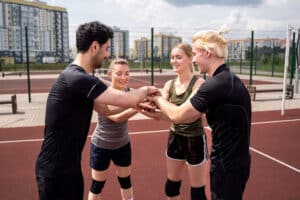Sports for Social Good: How Athletics Are Driving Change
We all love the thrill, but sports are more than just games.
Sports are superheroes of today’s time. Some power in sports goes beyond all of these moves and goals.
Sports are secret change agents, breaking down walls and starting conversations that matter.
It is not just about winning; it is about changing the game for social good.
Exciting?
Get ready for a ride where sports become the heroes we didn’t know we needed.

The Rise of Sports for Social Good
If we look at the past, sports have stood as powerful agents of social change.
It has left an indelible mark on the collective consciousness.
Sports are not just for epic matches; it is doing something big- social change.
In the ring, Muhammad Ali isn’t just throwing punches, he’s fighting for civil rights.
In 1968, two Olympic heroes, Tommie Smith and John Carlos, make history with a raised fist, shouting, “Change is coming!”
And today—Colin Kaepernick kneels, stirring up conversations about justice.
And the U.S. Women’s Soccer Team? They’re not only scoring goals; they’re tackling gender pay gaps.
But it is not only players; even sports themselves are joining the revolution. Now, it is promoting justice, sustainability, and community love. Game on for a better world!
Current Landscape
In today’s world, sports have evolved for social good.
Athletes and organizations influence people and engage them beyond the field.
In the modern sports arena where you’ll find more games—it’s a powerhouse for social good.
Athletes and teams are not just playing; they’re taking huge initiatives, which is for good.
If you look around, you’ll see athletes speaking on racial injustice, demanding equality and change.
With the help of campaigns for mental health awareness and green game plans, sports are buzzing around the globe.
But wait, it’s not just about the wins and losses.
Teams are becoming hometown heroes, scoring big with projects that give back to their communities.
Sports today are about more than just competition; they’re on a mission to change the world. So get ready for a new era where sports are played with purpose.

Athletes as Advocates
Athletes are powerful advocates for social causes, using their fame for meaningful changes.
Athletes are real-life superheroes, not just on the field.
They’ve become champions of change, using their fame for something more profound.
- Indian Boxing champion Mary Kom is not just throwing pinches in the ring but also punching on animal cruelty.
- LeBron James isn’t just scoring hoops; he’s scoring wins for education and fighting for at-risk kids.
- Marcus Rashford isn’t just kicking goals; he’s kicking child hunger out of the game in the UK.
- And Serena Williams? She’s not just acting on the court; she’s embracing the fight for gender equality.
It is not all about the spotlight; it is about social change.
Athletes are not just sharing their game highlights, they’re sharing their hearts.
They’re not just scoring points; they’re scoring a future where sports isn’t just a game; it’s a game-changer for the world.
Sports-Based Youth Development Programs
Sport-grounded youth development programs harness the transformative power of sport to inseminate critical life chops, leadership rates, and community engagement in youthful individuals.
Systems similar to the Harlem RBI program and Right to Use use signage as a vehicle for comprehensive development to target underserved communities around the world.
These programs extend beyond erecting athletic chops, with an emphasis on cooperation, discipline, and inflexibility.
By furnishing a structured and probative terrain, sport-grounded youth development programs help facilitate academic achievement, reduce crime rates, and increase overall well-being.
Through mentoring, skill development, and positive fitness, this program empowers youth. It creates a generation that excels in sports and becomes socially responsible and engaged citizens.
The impact of sport-grounded youth development extends beyond the playing field, showcasing individuals who make a positive donation to their communities.
Breaking Barriers through Sports
In the field of sports, numerous inspiring stories show the capability to break down social walls and support integration and diversity.
Athletes will be icons of reality, not just pretending but tearing down the walls of prejudice.
Jesse Owens, the 1936 Olympic athlete, ran through ethical conceptions as a champion.
Suppose Billie Jean King breaks the mood in the Battle of the Connections, proving that equivalency isn’t just a dream but the point of the game.
The Paralympic Games, where athletes with disabilities explore what’s possible, show that strength knows no bounds.
And in sports, businesses score big for LGBTQ addition, rewriting the rules to accommodate everyone.
These stories aren’t just blasts on the field but blows against borders, creating a new playbook for an inclusive and welcoming society. Games, with their different levels, are getting the game changer we all need.
Sports and Community Building
Sports Enjoy a unique eventuality to serve as a unifying force, bringing colorful groups together and fostering a profound experience of belonging.
Original sports events, from grassroots competitions to neighborhood events, have the energy to go beyond differences and produce a participated identification among network individuals.
Like a soccer field buzzing with power, not just from the sport but from the vibrant blend of a while and backgrounds.
It’s no longer just a match; it’s a melting pot in which network contributors protest conceptions that are out of bounds and embrace a participated identity.
It’s now not only a sport; it’s a collaborative ardor that spills over to original groups, growing a fellowship that turns into the twinkle of the community.

Challenges and Criticisms
Let’s learn about the challenges related to sport for the good and how these challenges can be addressed for further effective impact.
Despite the great social good that sports can do, they aren’t without challenges and reviews.
A common challenge is the threat of superficial interventions, where sporting or product conditioning is viewed as purely emblematic conduct without palpable impact.
Critics say that with harmonious trouble and real results, the game-changing power can be expanded.
A comprehensive approach is required to address these challenges.
You should prioritize long-term interventions over short-term events, emphasizing ongoing programs that make meaningful benefactions to social issues.
Translucency and responsibility are essential, ensuring that the social impact of sports programs can be measured and communicated effectively.
In addition, there may be enterprises about acquisition and equal representation, with some sports designed to ban certain brigades.
To overcome this, it’s important to promote diversity and ensure access to sporting opportunities for all populations.
By proactively addressing these challenges, Games for Social Good can be a more effective force for positive change, ensuring that their impact extends beyond sport to give lasting social benefits and regular results.
Future Outlook
The future of sports conditioning as a catalyst for social trade holds thrilling prospects, with rising traits indicating a broader and more impactful event.
One key prediction is the deepening integration of period, using virtual structures and digital reports to enhance the attainment and engagement of sports conditioning systems.
Virtual fact, interactive apps, and online communities will presumably especially join athletes, suckers, and social reasons encyclopedically.
Likewise, sports conditioning significantly emphasizes sustainability, with businesses and occasions prioritizing eco-friendly practices.
From inexperienced tasks to rainfall advocacy by using athletes, the future of sports conditioning aligns with environmental attention, addressing pivotal problems beyond the societal realm.
The addition and commission of underrepresented companies also are prognosticated to be at the van.
As sports conditioning breaks walls, there is an effective trend towards making the same openings for athletes from different backgrounds, fostering inclusivity, and amplifying marginalized voices.
The fortune of sports is a pressure for social change marked using technological invention, environmental stewardship, and fidelity to inclusivity, promising a dynamic geography in which sports plays a decreasingly more influential part in shaping a better, less indifferent transnational.
The Final Say
In conclusion, sports continue to stand as a powerful force for social good, transcending boundaries and inspiring positive change.
From historical milestones to current initiatives, the transformative impact of sports on society is undeniable.
As we navigate the future, let us stay engaged and supportive of the evolving landscape where athletes, communities, and fans collaborate for a better world.
Whether breaking barriers, fostering inclusivity, or championing causes, the realm of sports remains a dynamic platform for driving meaningful social impact.
Together, we can celebrate and contribute to the ongoing narrative of sports as a catalyst for positive change.
Ready to make a positive impact in the world?
UPDEED is the place for you. Our free and open platform is filled with inspiring stories from individuals and organizations who are making a difference in their communities and beyond. Connect and collaborate with like-minded individuals from around the globe on UPDEED, and discover your own potential to create meaningful change. Join our community and make a difference.





